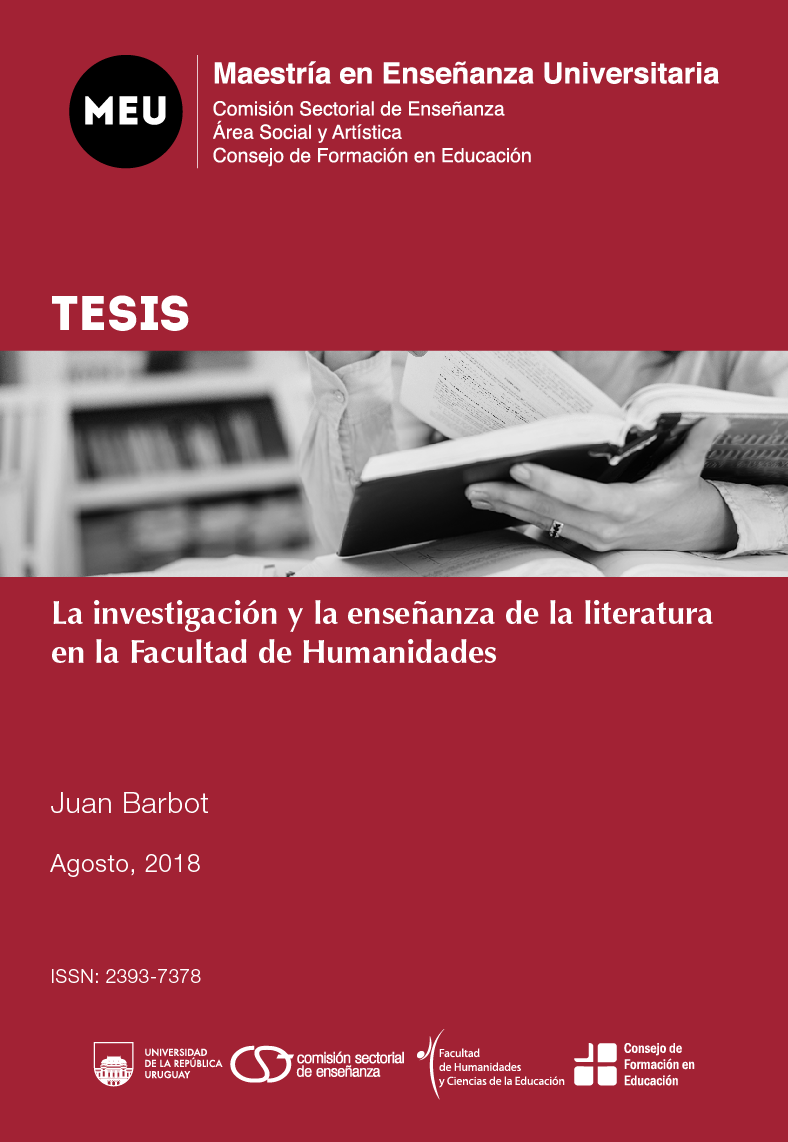Resumen
En esta tesis estudiamos algunos textos sobre literatura producidos por la Facultad de Humanidades y Ciencias durante su período inicial de funcionamiento (1945-1955). Integran el corpus las Actas de la FHC, conservadas en el Archivo Central Universitario, y la primera publicación del servicio, la Revista de la FHC entre otros documentos. Como objetivos señalamos el análisis de la investigación y la enseñanza de la literatura a través de las primeras producciones textuales de la FHC. Se atiende a las diferentes concepciones que se desarrollaron entonces, especialmente dos: el estudio de la literatura mediante metodología científica, y el abordaje de la literatura con sesgos de autor. En este sentido se hace énfasis en los conceptos de “investigación” y “ciencia” que se encuentran en las fuentes analizadas. La metodología de trabajo consistió en la delimitación del objeto de análisis y la búsqueda de material en el archivo de la FHCE, así como la recuperación de los artículos de la Revista de la FHC relacionados con la lectura de las actas del Consejo. Se destacan los procesos de ordenamiento, selección y análisis de las mencionadas fuentes. Los documentos se estudiaron mediante un marco teórico que considera aportes relativos a la importancia del contexto (Teun Van Dijk) para la lectura de las actas. En el caso de los textos de la Revista se manejó bibliografía que discute la naturaleza y alcance del género ensayístico (Adorno, Real de Azúa), y de la escritura científica (Locke, Chartier, Becher, Burke). Se intentó situar históricamente los textos y dar cuenta de sus características como generadores y divulgadores de conocimiento en el ámbito de los estudios de la literatura. Se destacan los siguientes resultados: la verificación de la existencia de tendencias formales o científicas, en correlato de otras posiciones con metodologías más laxas; el rescate de referentes pedagógicos postergados, como José Pedro Segundo y la recuperación de disputas internas que constituyeron tensiones generadoras en una facultad que estaba creándose. El análisis de los ensayos de Roberto Ibáñez, José Pedro Segundo, José Bergamín y Gervasio Guillot Muñoz arroja perspectivas respecto de la formación del conocimiento humanístico, ya sea mediante cánones científicos, literarios, o usando de ambos estilos. Quizás la conclusión más importante sea la posibilidad de desarrollar este análisis de la FHCE, y la inclusión del IPA en futuras investigaciones que se interroguen: ¿Cómo se estudió la literatura en la educación superior del Uruguay?
Palabras claves
literatura uruguaya, ensayo y crítica académicos, investigación y ciencia en la literatura, enseñanza superior de la literatura
Abstract
In this thesis we study some texts about literature produced by Faculty of Humanities and Sciences during its initial period of operation (1945-1955). The Proceedings of the FHC integrate the corpus, they have been preserved in the Central University Archive, also the first service publication, the FHC’s Magazine, among others documents. As objectives we indicate the analysis of the research and the teaching of literature through the first textual productions of the FHC. It deals with the different conceptions that devel- oped then, especially two of them: the study of literature through scientific methodology, and an approach to literature with author biases. Is in that way that the emphasis is placed on the concepts of “research” and “science” that are founded in the analyzed sources. The work methodology consisted in the delimitation of the object of analysis and the search of material in the archive of the FHCE, as well as the recovery of the articles of the Magazine of the FHC related with the reading of the council’s proceedings. The ordering, selection and analysis processes of the mentioned sources have been stand out. The documents have been studied through a theoretical framework that considers contributions related to the importance of the context (Teun Van Dijk) for reading the proceedings. In the case of the magazine’s texts, a bibliography that discusses the nature and the scope of the essay genre was handled (Adorno, Real de Azúa), and about the scientific writing (Locke, Chartier, Becher, Burke). On this work, I have tried to situate historically the texts, and also account for their characteristics as generators and disseminators of knowledge in the field of literature studies. The following results stands out: the verification of the existence of formal or scientific tendencies, in correlation of other positions with more lax methodologies; the rescue of important and postponed figures such as José Pedro Segundo; the recovery of internal disputes that constituted generating tensions in a faculty that was being created. The analysis of the essays of Roberto Ibáñez, José Pedro Segundo, José Bergamín and Gervasio Guillot Muñoz throws perspectives regarding the formation of humanistic knowledge, either through scientific, literary canons, or using both styles. Perhaps the most important conclusion could be the possibility of developing this analysis of the FHCE, and the inclusion of the IPA, in future investigations that also questioned: How was literature studied in higher education in Uruguay?
Keywords
Uruguayan literature, essay and criticism, research and science in literature, higher education in literature
Director(es) de tesis
- Antonio Romano
Tribunal
- Hebert Benítez
- Gustavo Remedi
- Vania Markarián
- Antonio Romano
Fecha de Aprobación
23/08/2018
Dictamen
Aprobado con mención



